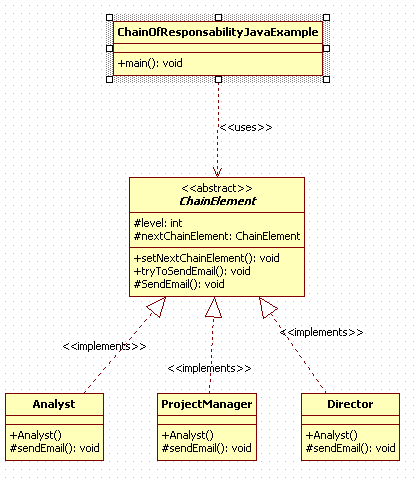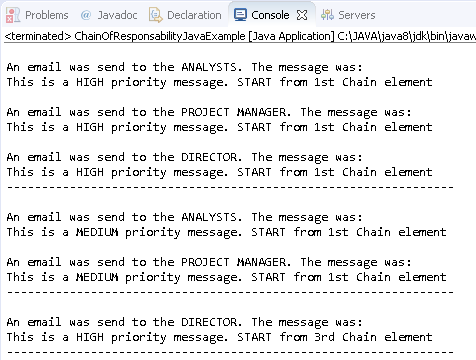#
Chain of Responsibility
This tutorial explains to you the design pattern named Chain of Responsibility (which is a Structural Pattern).
#
Chain of Responsibility Pattern - theory
Chain Of Responsibility Design Pattern in Java is used when we want to have a hierarchy of subsequent calls.
One request from a client is passed to a chain of objects to process them.
Take a look at the following UML diagram representing the Chain Of Responsibility design pattern (for my example):

#
Chain of Responsibility Pattern - example
Here is an example of using the Chain of Responsibility Design Pattern in Java:
package chainofresponsability.java.pattern.example;
public abstract class ChainElement {
// the level of importance 0=MAXIMUM, 1=MEDIUM, 2=LOW
protected int level;
//next element in the Chain of Responsibility
protected ChainElement nextChainElement;
public void setNextChainElement(ChainElement nextChainElement){
this.nextChainElement = nextChainElement;
}
public void tryToSendEmail(int level, String message){
if(this.level >= level){
sendEmail(message);
}
if(nextChainElement !=null){
nextChainElement.tryToSendEmail(level, message);
}
}
abstract protected void sendEmail(String message);
}
package chainofresponsability.java.pattern.example;
public class Analyst extends ChainElement{
public Analyst (int level){
this.level = level;
}
protected void sendEmail(String message){
System.out.println("\nAn email was send to the ANALYSTS. The message was:");
System.out.println(message);
}
}package chainofresponsability.java.pattern.example;
public class ProjectManager extends ChainElement{
public ProjectManager (int level){
this.level = level;
}
protected void sendEmail(String message){
System.out.println("\nAn email was send to the PROJECT MANAGER. The message was:");
System.out.println(message);
}
}package chainofresponsability.java.pattern.example;
public class Director extends ChainElement{
public Director (int level){
this.level = level;
}
protected void sendEmail(String message){
System.out.println("\nAn email was send to the DIRECTOR. The message was:");
System.out.println(message);
}
}package chainofresponsability.java.pattern.example;
public class ChainOfResponsabilityJavaExample {
public static void main(String[] args) {
ChainElement firstChainElement = new Analyst(2);
ChainElement secondChainElement = new ProjectManager(1);
ChainElement thirdChainElement = new Director(0);
firstChainElement.setNextChainElement(secondChainElement);
secondChainElement.setNextChainElement(thirdChainElement);
firstChainElement.tryToSendEmail(0, "This is a HIGH priority message. START from 1st Chain element");
System.out.println("----------------------------------------------------------------");
firstChainElement.tryToSendEmail(1, "This is a MEDIUM priority message. START from 1st Chain element");
System.out.println("----------------------------------------------------------------");
thirdChainElement.tryToSendEmail(0, "This is a HIGH priority message. START from 3rd Chain element");
System.out.println("----------------------------------------------------------------");
}
}When you run this example you will receive the following result:


